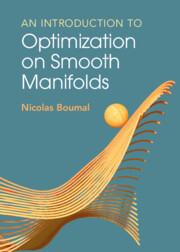Book contents
- Frontmatter
- Dedication
- Contents
- Preface
- Notation
- 1 Introduction
- 2 Simple examples
- 3 Embedded geometry: first order
- 4 First-order optimization algorithms
- 5 Embedded geometry: second order
- 6 Second-order optimization algorithms
- 7 Embedded submanifolds: examples
- 8 General manifolds
- 9 Quotient manifolds
- 10 Additional tools
- 11 Geodesic convexity
- References
- Index
2 - Simple examples
Published online by Cambridge University Press: 09 March 2023
- Frontmatter
- Dedication
- Contents
- Preface
- Notation
- 1 Introduction
- 2 Simple examples
- 3 Embedded geometry: first order
- 4 First-order optimization algorithms
- 5 Embedded geometry: second order
- 6 Second-order optimization algorithms
- 7 Embedded submanifolds: examples
- 8 General manifolds
- 9 Quotient manifolds
- 10 Additional tools
- 11 Geodesic convexity
- References
- Index
Summary
Before we define any technical terms, this chapter describes simple optimization problems as they arise in data science, imaging and robotics, with a focus on the natural domain of definition of the variables (the unknowns). In so doing, we proceed through a sequence of problems whose search spaces are a Euclidean space or a linear subspace thereof (which still falls within the realm of classical unconstrained optimization), then a sphere and a product of spheres. We further encounter the set of matrices with orthonormal columns (Stiefel manifold) and a quotient thereof which only considers the subspace generated by the orthonormal columns (Grassmann manifold). Continuing, we then discuss optimization problems where the unknowns are a collection of rotations (orthogonal matrices), a matrix of fixed size and rank, and a positive definite matrix. In closing, we discuss how a classical change of variables in semidefinite programming known as the Burer–Monteiro factorization can sometimes also lead to optimization on a smooth manifold, exhibiting a benign non-convexity phenomenon.
Information
- Type
- Chapter
- Information
- An Introduction to Optimization on Smooth Manifolds , pp. 4 - 15Publisher: Cambridge University PressPrint publication year: 2023
